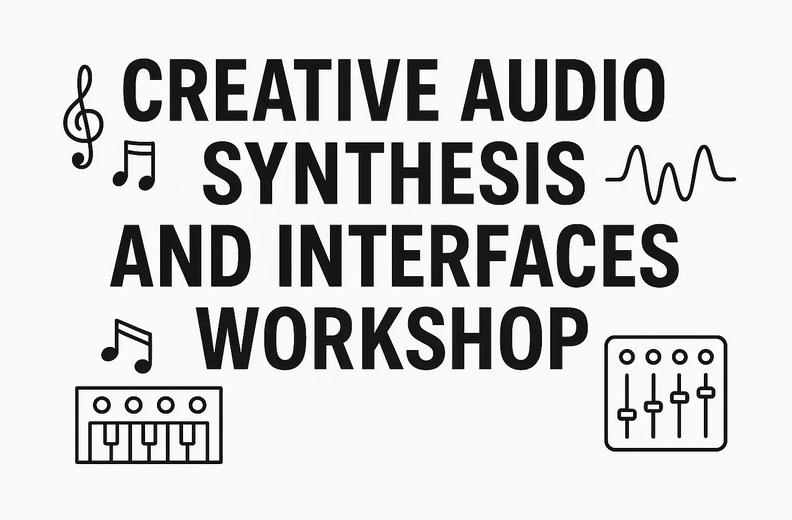 On 15 July, 2025, The Creative Audio Synthesis and Interfaces Workshop was held at Queen Mary University of London, organised by AIM COMMA Lab members Jordie Shier, Haokun Tian, and Charalampos Saitis, and supported by the UKRI Centre for Doctoral Training in Artificial Intelligence and Music (AIM) at the Centre for Digital Music (C4DM).
On 15 July, 2025, The Creative Audio Synthesis and Interfaces Workshop was held at Queen Mary University of London, organised by AIM COMMA Lab members Jordie Shier, Haokun Tian, and Charalampos Saitis, and supported by the UKRI Centre for Doctoral Training in Artificial Intelligence and Music (AIM) at the Centre for Digital Music (C4DM).
This one-day workshop included a series of talks exploring the intersection of creative audio synthesis and AI-enabled synthesizer programming.
Topics included evolutionary algorithms for sound exploration, synthesizer sound matching, timbre transfer, timbre-based control, reinforcement learning, differentiable digital signal processing, representation learning, and human-machine co-creativity.
Earlier this year, the AIM CDT visited the RITMO Centre for Interdisciplinary Studies in Rhythm, Time, and Motion at the University of Oslo in Norway.
A shared interest in creative applications of audio synthesis and novel interface designs was established during this visit, motivating this follow-up workshop at QMUL.
Researchers from RITMO, The Open University, and the AIM CDT at QMUL were invited to
share their work, engage in critical discussion, and map directions for
future work. See below for a summary of talks with links to presentation recordings.
An evening concert showcased musical applications of technical implementations discussed during the workshop, grounding these discussions in real-world artistic contexts.
Invited Talks
Designing Percussive Timbre Remappings: Negotiating Audio Representations and Evolving Parameter Spaces
Facilitating serendipitous sound discoveries with simulations of open-ended evolution
Autonomous control of synthesis parameters with listening-based reinforcement learning
Can a Sound Matching Model Produce Audio Embeddings that Align with Timbre Similarity Rated by Humans?
GuitarFlow: Realistic Electric Guitar Synthesis From Tablatures via Flow Matching and Style Transfer
- Jackson Loth — Queen Mary University of London
Timbre latent space transformations for interactive musical systems oriented to timbral music-making
Why Synthesizer Parameter Estimation Is Hard and How to Make it Easy
Perceptually Aligned Deep Image Sonification
Modulation Discovery with Differentiable Digital Signal Processing
Musical Performances and Demos
Experience Replay (Performance)
- Vincenzo Madaghiele — University of Oslo
Weaving (Performance)
- Balint Laczko — University of Oslo
Phylogeny (Demo)
- Björn Thor Jónsson — University of Oslo
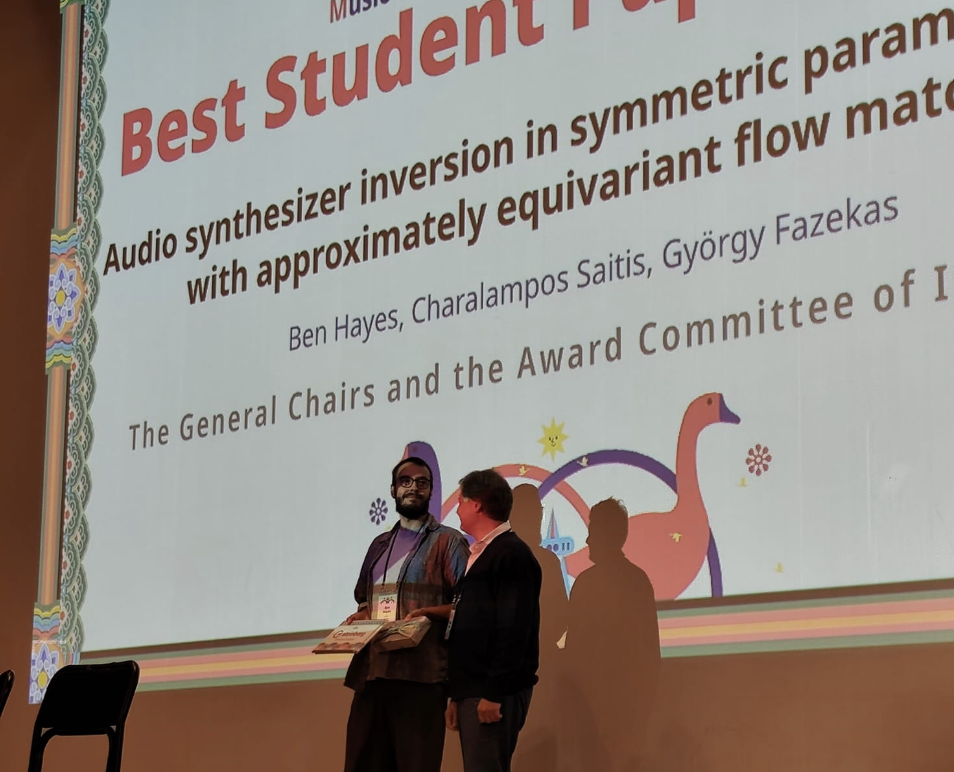 We are delighted to share that AIM PhD student Ben Hayes, along with AIM supervisors Charalampos Saitis and George Fazekas, have received the best student paper award at the ISMIR 2025 conference. The paper “Audio Synthesizer Inversion in Symmetric Parameter Spaces With Approximately Equivariant Flow Matching” proposes using permutation equivariant continuous normalizing flows to handle the ill-posed problem of audio synthesizer inversion, where multiple parameter configurations can produce identical sounds due to intrinsic symmetries in synthesizer design. By explicitly modeling these symmetries, particularly permutation invariance across repeated components like oscillators and filters, the method outperforms both regression-based approaches and symmetry-naive generative models on both synthetic tasks and a real-world synthesizer (Surge XT).
We are delighted to share that AIM PhD student Ben Hayes, along with AIM supervisors Charalampos Saitis and George Fazekas, have received the best student paper award at the ISMIR 2025 conference. The paper “Audio Synthesizer Inversion in Symmetric Parameter Spaces With Approximately Equivariant Flow Matching” proposes using permutation equivariant continuous normalizing flows to handle the ill-posed problem of audio synthesizer inversion, where multiple parameter configurations can produce identical sounds due to intrinsic symmetries in synthesizer design. By explicitly modeling these symmetries, particularly permutation invariance across repeated components like oscillators and filters, the method outperforms both regression-based approaches and symmetry-naive generative models on both synthetic tasks and a real-world synthesizer (Surge XT).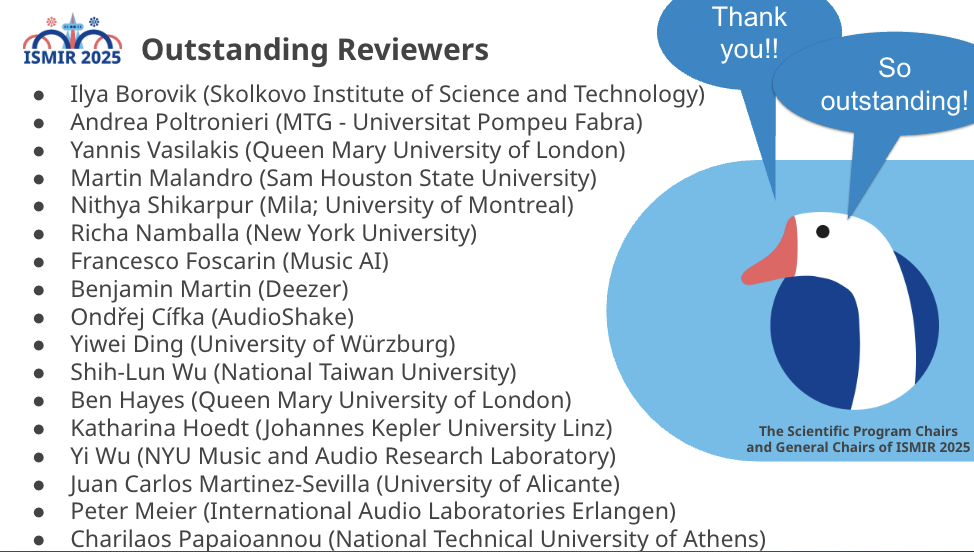
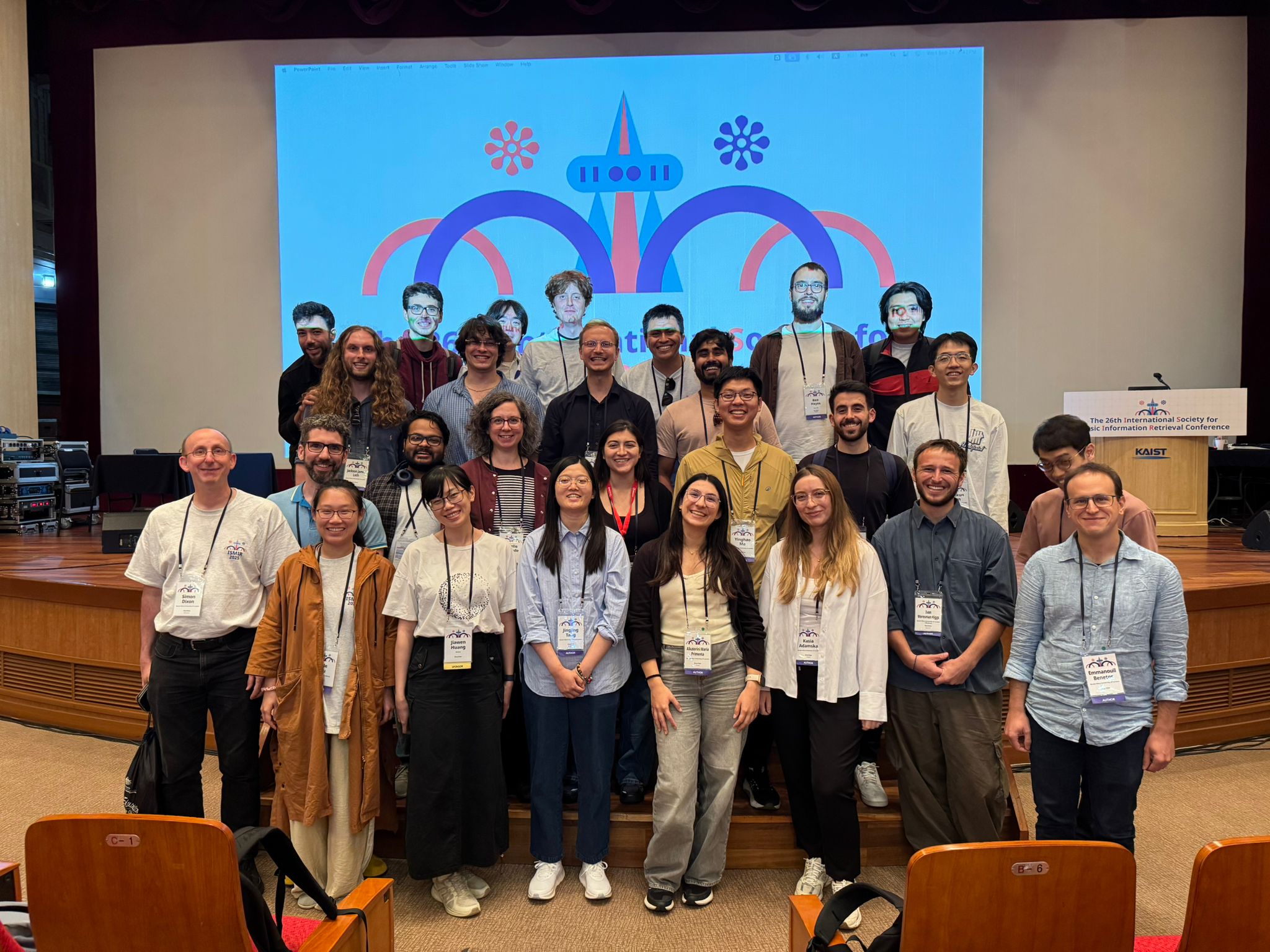 This wraps up a fantastic week at ISMIR 2025 in Daejeon, South Korea, with very strong AIM participation. Pictured are current and past C4DM members, including many AIM members.
This wraps up a fantastic week at ISMIR 2025 in Daejeon, South Korea, with very strong AIM participation. Pictured are current and past C4DM members, including many AIM members.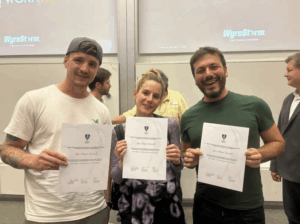 We are delighted to share that Mary Pilataki, a PhD student at AIM, has received the Best Paper Award at the Audio Engineering Society International Conference on Artificial Intelligence and Machine Learning for Audio (AES AIMLA) 2025.
We are delighted to share that Mary Pilataki, a PhD student at AIM, has received the Best Paper Award at the Audio Engineering Society International Conference on Artificial Intelligence and Machine Learning for Audio (AES AIMLA) 2025. On 15 July, 2025, The Creative Audio Synthesis and Interfaces Workshop was held at Queen Mary University of London, organised by AIM
On 15 July, 2025, The Creative Audio Synthesis and Interfaces Workshop was held at Queen Mary University of London, organised by AIM